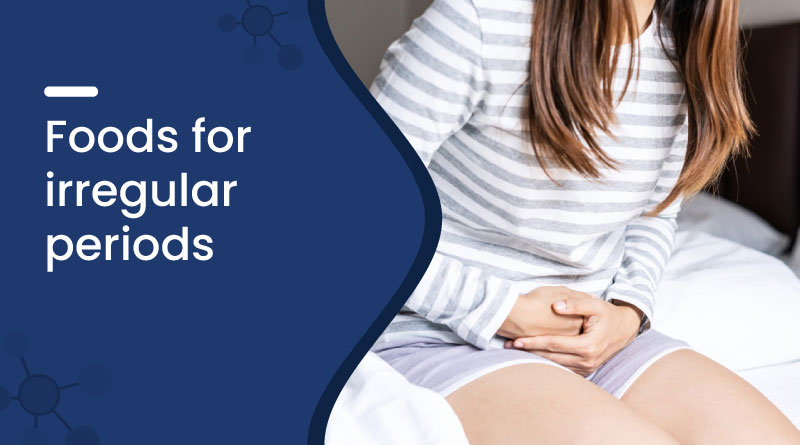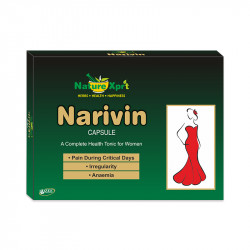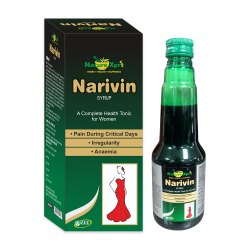Best Foods for Irregular Periods – Naturally Balance Hormones


Irregular periods are common among women, often involving delayed or unpredictable menstrual cycles. Diet and lifestyle play a significant role in maintaining hormonal balance, which in turn affects a woman’s monthly cycle. In this blog, we’ll explore the common causes of irregular periods, what they might signal about your health, and how the right foods and habits can support a more regular cycle.
What Are Irregular Periods?
For most women, a regular menstrual cycle spans anywhere from 21 to 35 days. If your period often comes early, late, skips a month, includes spotting, or you experience unusually heavy or light bleeding, it may be considered irregular.
Common Causes of Irregular Periods
Several factors, both physical and lifestyle-related, can affect your cycle:
- Polycystic Ovary Syndrome (PCOS)
- Thyroid disorders (hypothyroidism or hyperthyroidism)
- Stress and anxiety
- Sudden weight gain or loss
- Lack of physical activity or over-exercising
- Poor diet or nutritional deficiencies
- Hormonal imbalances
- Certain medications or birth control pills
- Diabetes or insulin resistance
What Can Irregular Periods Indicate?
While an occasional delay isn’t usually a concern, frequent irregularities can point toward:
- Hormonal disorders like PCOS or thyroid issues
- Diabetes or issues with insulin sensitivity
- Fertility concerns
- Nutrient deficiencies
- Underlying mental health concerns, like eating disorders or chronic stress
Foods That May Help Regulate Periods
| Category | Examples |
|---|---|
| Iron-Rich Foods | Spinach (Palak), Methi (Fenugreek leaves), Amaranth (Chaulai), Pomegranate, Dates and raisins, Jaggery (Gur), Ragi (Finger millet) |
| Omega-3 Fatty Acids | Flaxseeds (Alsi), Walnuts, Chia seeds, Fish (for non-vegetarians) |
| Complex Carbohydrates | Brown rice, Oats, Whole wheat roti, Jowar, Bajra, Ragi, Sweet potatoes |
| Protein-Rich Foods | Paneer (in moderation), Moong dal, Toor dal, Rajma, Chana, other legumes, Sprouts, Curd (Dahi), Eggs (if non-vegetarian) |
| Antioxidant-Rich Foods | Amla (Indian gooseberry), Blueberries, Strawberries (if available), Turmeric (Haldi), Tulsi (Holy Basil) tea, Cinnamon and Ginger tea |
| Hydrating Foods and Drinks | Coconut water, Cucumber, Watermelon, Herbal teas (ginger, cinnamon, chamomile), Warm water with lemon and honey |
| Menstrual-Stimulating Foods | Raw papaya, Sesame seeds (Til), Pineapple, Fennel seeds (Saunf), Carom seeds (Ajwain) |
Also read - How to Get Periods Immediately If Delayed
Which Foods to Avoid If You Have Irregular Periods?
Limiting certain foods can prevent hormonal fluctuations and support a healthier cycle:
- Refined sugars and processed foods: Can cause insulin surges and interfere with hormonal balance
- Too much caffeine may raise cortisol levels and interfere with estrogen balance
- Too much dairy: May increase inflammation in some women
- Fried and oily foods: May slow down digestion and hinder your metabolic rate
Lifestyle Tips to Support Regular Periods
- Maintain a Healthy Weight: Being underweight or overweight can both disturb your hormonal balance.
- Exercise Regularly: Yoga, walking, and strength training help reduce insulin resistance and support healthy hormone levels.
- Manage Stress: Practice deep breathing, meditation, or journaling to lower cortisol levels, which impact your cycle.
- Track Your Periods: Use a menstrual calendar or app to monitor changes and spot patterns.
- Get Enough Sleep: Poor sleep affects hormones like melatonin and cortisol that indirectly influence your reproductive health.
Conclusion
Irregular periods are common and often reflect a need for balance, especially in your diet and daily habits. By including nutrient-dense, hormone-friendly foods and avoiding stress and unhealthy choices, you can support a more regular, healthier cycle. Every woman’s body is different. It’s always a good idea to talk to a healthcare professional before making major dietary changes, especially if you’re managing an underlying condition.
Frequently Asked Questions (FAQs)
Q. Can diet alone regulate periods?
A. Diet plays a key role, but it works best when combined with lifestyle changes and medical care if needed.
Q. Can stress delay my periods?
A. Absolutely. When you're stressed, your cortisol levels rise, potentially affecting the hormonal balance and your menstrual cycle.
Q. Do irregular periods indicate an underlying health issue?
A. Yes. They may signal underlying issues such as PCOS, thyroid imbalance, eating disorders, or even early menopause. If irregularity persists, medical evaluation is recommended.
Q. How many days of delay is considered normal?
A. A delay of up to 7 days is usually considered normal. However, consistent delays or missed periods should be investigated.
Q. What foods can help get my period on time?
A. Foods like sesame seeds, papaya, flaxseeds, ginger tea, jaggery, and leafy greens may help stimulate or regularize menstruation naturally.
Q. Does weight affect menstrual regularity?
A. Yes. Both excessive weight and being underweight may interfere with hormone regulation and ovulation, causing menstrual irregularities.
Tagar (50 mg) + Jatamansi (60 mg) + Triphala (70 mg) + Punarnava (80 mg) + Arjun (45 mg) + Bhangra (50 mg) + Shuddha Guggul (45 mg) + Kasis Bhasma (30 mg) + Mandoor Bhasma (30 mg) + Mukta Sukti Bhasma (40 mg)
10 Capsules in 1 strip
Ashok (75 mg) + Lodhra (35 mg) + Patranga (30 mg) + Sariva (35 mg) + Kumari (65 mg) + Shatavari (30 mg) + Bala (60 mg) + Punarnava (45 mg) + Ashwagandha (40 mg) + Daru Haldi (35 mg) + Ulatkambal (65 mg) + Dashmool (40 mg) + Mochras (30 mg) + Chandrasur (60 mg) + Bol (30 mg)
225ml in 1 bottle
Recent Blogs
Disclaimer : Zeelab Pharmacy provides health information for knowledge only. Do not self-medicate. Always consult a qualified doctor before starting, stopping, or changing any medicine or treatment.


















 Added!
Added!